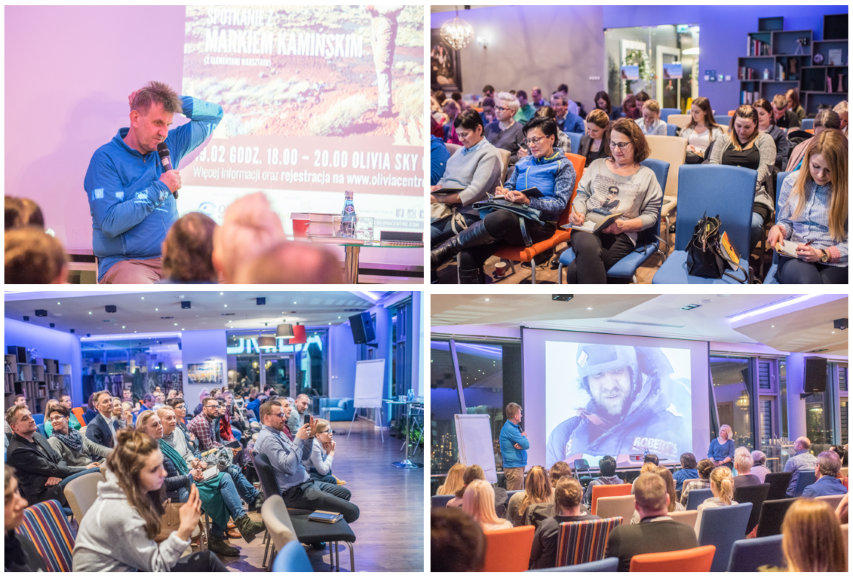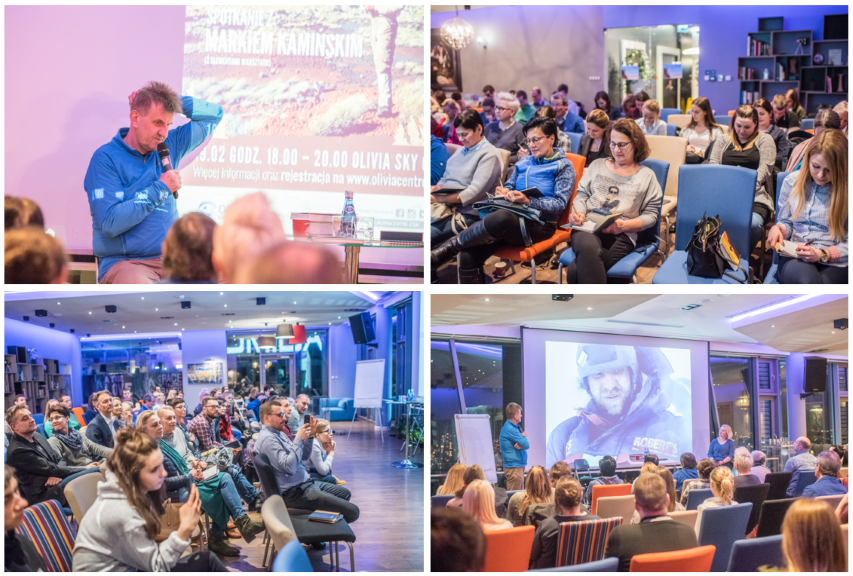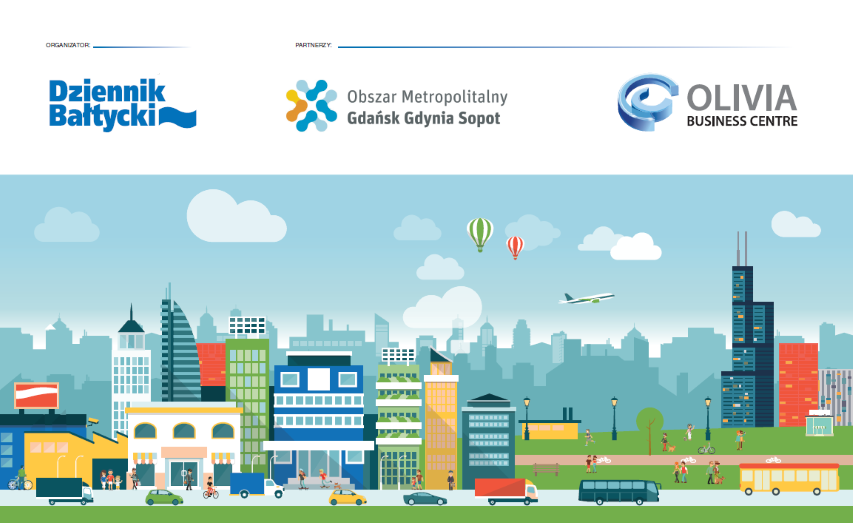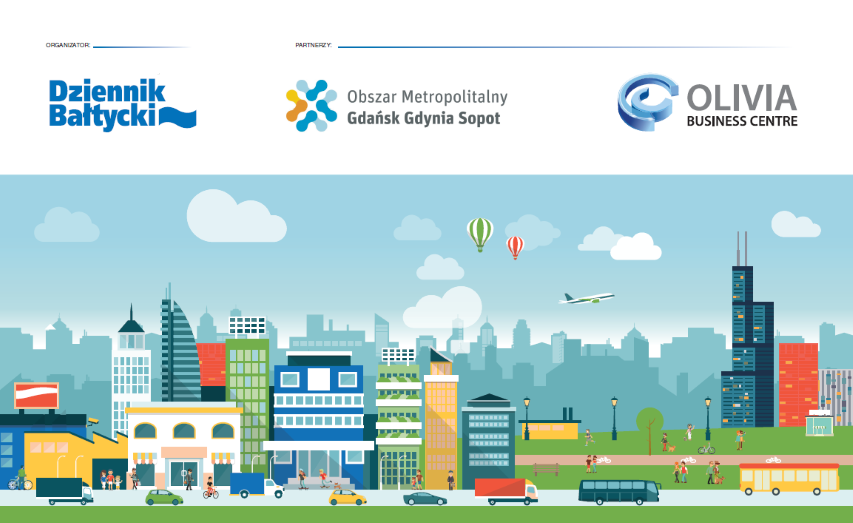Teal self-organization – a new work paradigm
It is Wednesday, a freezing February evening. The Olivia Sky Club is full. Guests wait for the start of a lecture by professor Andrzej Blikle “Let us talk about Teal!”. The lecture was organized by Joanna Roszkowska and Maciej Winiarek, founders of Thinking Zone – a primary school, junior high school and senior middle school.
Earlier on the same day, a few hours’ long workshop titled “Teal self-organisation” was conducted by professor Blikle for headmasters of Tri-City schools in the Coworking O4 where the Thinking Zone is located.
More than 200 people participated in both events, including teachers and headmasters, parents and entrepreneurs. Professor Blikle was talking about the work in turquoise organizations and their management. According to organisers of the meeting, such knowledge can be an inspiration for many to change their way of thinking, communication and even life…
What was the motivation for creators of the Thinking Zone to organize these events? “We are driven by values that converge with the values of the teal: share the information, surround yourself with partners, seek cooperation, do not stop developing. This is the direction we have taken in our school, the approach we share with our environment, this is how we create the culture of thinking and partnership”, say Joanna Roszkowska and Maciej Winiarek.
How to start the implementation of the teal management concept?
Basic aspects of the teal management are contained in the book by Frederic Laloux “Pracować inaczej” (“Working Differently”). In a “teal organization”, traditional management comes second to self-organisation based on participation. Professor Andrzej Blikle is the ambassador of the above-mentioned concept in Poland and supports leaders of firms in the creation of high business culture and quality in general. He is also the author of books presenting the teal topics in detail: “Doktryna jakości. Rzecz o skutecznym zarządzaniu” and “Doktryna jakości. Wydanie II turkusowe. Rzecz o turkusowej samoorganizacji”.
Benefits resulting from teal implementation according to professor A.Blikle
“So, it is not true, as we can sometimes hear, that the joy of work is a luxury we cannot afford today. Just the opposite, the lack of such job generates significant costs, both emotional and material ones. In a team based on suspiciousness and violence, we have fighting and games, we destroy one another and, as a result, we are unhappy and our actions bring about mediocre or even destructive results.
The first law of social gravity says that people trusting one another and acting out of dignity reasons are better in attaining the defined goals.
Why is the happy cooperation not as common as it deserves today? I believe that the main reason is a false belief related to motivational mechanisms and, therefore, to the role of the leader in a team.
All the commonly used “motivators” based on the “carrot and stick” principle (awards, commissions, bonuses etc.) invariably lead to the situation that I call a war game between the strong who holds the stick or the carrot and the weak who is subjected to such measures. Actually, the difference between the stick and the carrot is only an illusion because avoiding the stick acts as the carrot while being deprived of the carrot acts as the stick.
Encouraging people to work with the use of the stick or the carrot also results in the fact that, for the weak one, getting the carrot or avoiding the stick becomes the most important goal, the end that justifies the means because the stick and the carrot automatically switch off the internal motivation to act. A student who studies for a mark rather than to acquire knowledge, concentrates his resourcefulness on the cheating.”*
Interview with professor Andrzej Blikle
How to develop the potential of firms and people, why is it worthwhile to open up to new ideas and activities and how to find a path to good life without waiting for the old age pension?, we are talking to professor Andrzej Blikle as a part of the “Olivia’s Conversations” cycle.
Monika Bogdanowicz (Communication Expert, Olivia Business Centre): Observing your life, one can see that you have been active in many professional fields. You have been a businessman, a teacher, a lecturer and with a lot of success. What are your favourite flavours of life – or what is worth doing for life to have flavour? What is your recipe for a happy life people dream about?
Professor Andrzej Blikle: There is just one recipe for happiness but it is possible to interpret it differently. I believe that one should do what one likes doing. And this is what I advise to all young people. When you choose a profession, think of what you would like to do rather than what can let you make a fortune. If you do something you like you will do it well; and if you do it well there will be demand for your work. I was talking about it during the lecture in the Olivia Business Centre. One should strive for a good daily life and the success and money usually come as a consequence. Tasting life mostly consists of doing what you like, and if you like it you will be good in it and do it well. This is when we improve and it is known that mastery can only be attained within the limits of one’s talents. It is worthwhile to devote oneself to what we are talented at, we just have to be able to recognize the talent. The difficult thing about talent is that, if we like something very much we believe that this is our talent. However, I would like to clarify. One should do what one likes but it means that it should be our passion. For example, people say: “I like sitting in a bar so I will open a drink bar and it will be great”. However, it usually turns out that sitting in a bar as its manager is not the same as sitting there as a customer. You have to find an occupation that will encourage us to act, that will “pay” us the dignity award. Because of that, you have to think what to do in order to be satisfied with it. This is the most important source of the motivation to act.
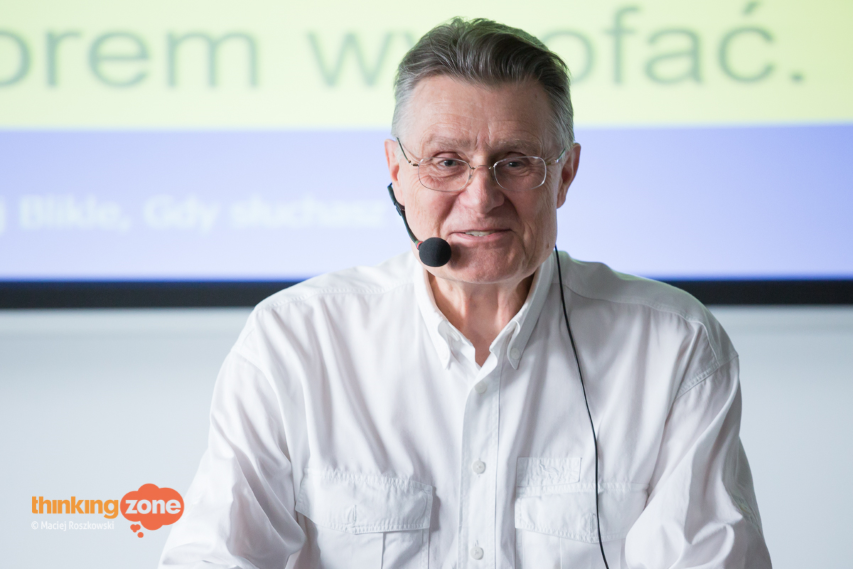
Photographer: Maciej Roszkowski, We Love Photo, on the picture: professor Andrzej Blikle at the “Teal self-organisation – a new work paradigm” workshop
M.B.: We have to make hundreds of choices every day now, in each area: from daily matters to most important issues related to career path or business. Hundreds of possibilities in each area related to our lives. Is the unlimited field of possibilities offered to us by the contemporary world good or, perhaps, too many options make a successful choice more difficult?
A.B.: This is not how I would formulate the question: whether it is good for the world to be as it is. This is how it is and we have to cope with it. However, there are various emotional profiles. Some want to have a very wide choice while others prefer someone helping them to choose. Some want to have a lot while others prefer having less because possession entails various obligations (e.g. you have to take care of your car) and dangers (it can be stolen). In particular, young people today believe that many things are not worth owning. It is enough to be able to use them. I think that it is a good direction. I have no car and when I need to go somewhere I simply order it via an application in my phone. I find the car around the corner, drive it for as long as I want and leave it where I want to. This option is not yet common in Poland but it is available in many other countries. You can use luxury goods in the same way, e.g. borrow a top shelf tie for one evening or a handbag by one of the most expensive brands. Thanks to this solution, you can use something for a weekend for 30 pounds while the same object is worth a few thousand pounds and you cannot afford buying it. Instead, you can have it and use it according to your needs. I think that this direction, this trend will develop.
M.B.: To whom the Polish business wants to listen and to whom it listens? Who are today’s key economists, advisors or entrepreneurs to whom the Polish leaders, company managers listen?
A.B.: Oh, they may vary. There is no single answer to this question. My experience is that each manager has different expectations. And, we have to remember that economics, which is so important in the business, is not management knowledge. They are two different areas. Just as information technology is not electronics. Obviously, businessmen listen to economist, those good and important ones, and they also sometimes listen to those who say unwise things. E.g. I believe that Milton Friedman stated something very harmful and people believed him as a winner of the Nobel prize in economics. He said that “profit maximization is the main goal of each business organization”. Why do I believe it to be unwise? Because the goal of a firm is what owners define as their goal. Period. In turn, it is the law of the economy that profit is a necessity but it does not mean that it has to be the goal. One has to eat in order to live (necessity) but the one who lives in order to eat (goal) has a shorter life. The situation is similar in the case of firms. One of them was called Enron, another one: Lehman Brothers. And there are many more examples.
M.B.: Well, then, who is an authority for the Polish entrepreneurs and for you as well in your opinion?
A.B.: It is not possible to mention just one authority. It is difficult to present inspiring people. I will not list all those very important business professors because I would probably omit someone. I can only say who inspired me. William Edwards Deming, Peter Ferdinand Drucker, Alfie Kohn – I have read many books by these authors. I appreciate very, very much what I learned from Marek Kosewski, a social psychologist who dealt with business psychology. I can recommend his book titled “Wartości, godność i władza. Dlaczego porządni ludzie czasem kradną, a złodzieje ujmują się honorem” (“Values, dignity and power. Why good people sometimes steal and thieves act honourably”). At this moment, a very important book for me from which I have learned a lot of significant things is a book by professor Rafał Ohme, “Emo Sapiens”; I have also written its review, which you can find on my page. Knowledge has to be drawn from various sources. For example, I recommend getting familiar with the activity of Jacek Jakubowski and Dorota Jakubowska, founders of the TROP Group who are a source of unceasing inspiration to me. Among other things, they manage a project titled “Communication for empathy”. I have learned a lot from them. Additionally, I cannot omit Jacek Santorski; he has been a source of a lot of inspiration to me for years. Inspiring people can significantly influence our development with their non-standard thinking. I recommend looking for such guides on your path.
M.B.: Your motto, coming from “The Constitution of Liberty”**, relating to the missionary activity in the area of promotion of high-quality management, is: “Advance consists in the few convincing the many. New views must appear somewhere before they can become majority views.” Does your activity promoting the teal organization opposing democracy, partnership and the shortening of the distance to the farm culture has a chance to be adapted well to the Polish business and what is the extent of such an organisation formula in Poland?
A.B.: I do not know whether anyone has researched that topic in Poland. I know that there is a person doing it in the High School of Finance and Management in Warsaw who intends to conduct such research. And wants to verify the population of Polish firms in our country. What I can say from my own observation is that, during my more than 80 meetings pre year, similar to the one in Olivia, 1 to 5 people approach me and say that they have already been organizing their work in this manner. Therefore, I meet about 200-300 people actively thinking about the teal style per year. And I did not hear such statements a few years ago. It is a sign of the growing popularity of the phenomenon in Poland.
M.B.: Do leaders of Polish firms want to go beyond the mental scheme and existing operating methods? Are they open to such ideas and do they want to implement them?
A.B.: Some of them do, others do not. Obviously, it is a novelty. In turn, the farm management syndrome is very common even though I am unable to say whether it prevails. Some think so, e.g. Jacek Santorski. The farm system is highly anti-democratic. Teal is not a majority democracy where the rule of thumb is that the majority is right. Shortly speaking, teal is the minority having knowledge of a case making decisions in each such case. It can be a different minority every time. This not the rule of the minority but rather a participation-based making of decisions in the atmosphere of trust. However, democracy is when the majority makes a decision even though it surely cannot know everything.
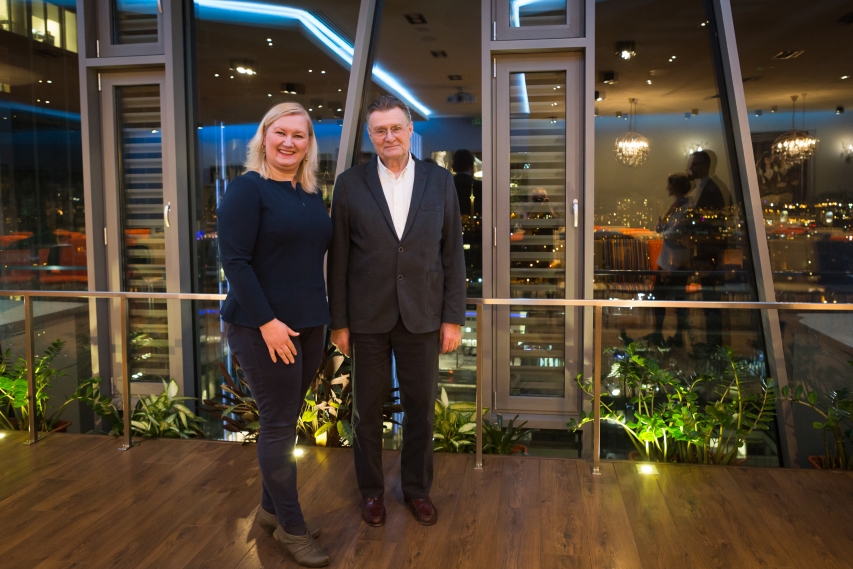
Photographer: Maciej Roszkowski, We Love Photo, on the picture: Monika Bogdanowicz (Olivia Business Centre), professor Andrzej Blikle
M.B.: Sceptics say that they do not believe in firms that have no bosses.
A.B.: Everyone has the right not to believe even in things that exist. When Ludwig Pasteur announced his discoveries, many doctors did not believe in the existence of microbes. On the other hand, the term “boss” is very broad. I think that each team needs leaders, leaders of ideas, social leaders, leaders who inspire people. Such people are necessary because a team in which nobody cares for anything will not operate well. Leaders are necessary – not one, supreme and infallible leader but many leaders. A different one in each case. Such a situation is fantastic.
M.B.: What are good examples of teal firms known in Poland?
A.B.: As I have already said, I meet a lot of such firms. Some are described on my page. They include Marco, Mentax, Brewa and KamSoft Podlasie. These are not large companies but I have learned recently that the Polish branch of Decathlon, an international corporation, is building the teal. The Polish Sodexho is also teal. Many firms do not know that method yet so this is a novelty for them. The situation in Poland varies when it comes to teal. Some have heard about it and believe it to be idiotic. Others have heard about it and want to go in that direction. Everything depends on the awareness of leaders deciding about the future of an organization.
M.B.: Are there any dangers related to the choice of teal that firms face? Not all firms want to change the world.
A.B.: First of all, there is a danger that this is a far-reaching revolution. If you do it unskilfully, for example, you can be in danger of using the “newspeak”. People start talking like they used to talk during the PRL times: “with the Soviet Union at the head”. And, whatever one said, if the sentence ended with the famous “with the Soviet Union at the head” there could be no discussion. Teal newspeak is about repeating slogans with no care for compliance with them in daily practice. If a firm is not aware of such a situation people will start treating teal as another manipulation of the management. If you enter that path once it will be difficult to turn back.
M.B.: You cannot decree trust…
A.B.: Obviously not!
M.B.: And how can we recognize whether that method is an authentic implementation and not just a declarative approach in a business environment?
A.B.: We have to talk frankly to people but, before that, you have to make them speak frankly to us, which is not easy at all. In fact, I have never said that it was easy. I said that it was effective and worthwhile but not easy for sure.
M.B.: You say: “I repeat to everyone that things you cannot influence are not worth worrying about”. Where do you find strength for such an intense daily activity?
A.B.: I train all the time. I train teaching: I have two training courses per week on the average, all year long. They sometimes last half an hour, two hours or even nine hours on a single day. So, I lecture a lot and I also exercise a lot: downhill skiing and ski alpinism are my number one sports but I also practice windsurfing, mountain biking, rowing on a skiff (i.e. Olympic one) and go to a gym during the winter in the city. Sports have always been practiced in my family. My parents were sportspeople, not professionals, but it has always been a significant part of their lives. I recommend sports to everyone as an important component of a good life.
M.B.: Thank you for the meeting and an inspiring conversation. I hope that it will help strengthen the importance of the idea of teal in Poland.
SEE THE GALLERY OF PHOTOS FROM THE MEETING:
Workshop “Teal self-organization”
Sky Club evening – the “Let us talk about Teal!” lecture
*”Doktryna jakości, wydanie II turkusowe. Rzecz o turkusowej samoorganizacji”, more here: http://www.moznainaczej.com.pl/137-dzialania/moja-ksiazka?start=12
**”The Constitution of Freedom” – a book considered one of the most renowned contemporary works on the philosophy of politics, a 20th century equivalent of John Stuart Mill’s “On Freedom”! The author, Friedrich August von Hayek, a winner of the Nobel Prize in Economic, discusses his theory of neoliberalism having the problem of an individual freedom understood as independence of the lack of coercion takes the central place. The author criticizes theories of political freedom as a power and an opportunity to fulfil the personality or welfare. He links personal freedom of an individual to the function of a free market economy based on the law of supply and demand. He objects to the classically understood justice that finds expression in the principles of the distribution of goods. He believes that imposing any distribution model on the society is a denial of freedom. Justice can only be based on the freedom of contract. according to the author, individual freedom is a necessary but insufficient prerequisite of existence of a social order because its contents are defined by moral principles regulating the use of freedom and unquestionable legal principles binding the will of the majority. Hayek analyses the way in which western societies defend individual freedom. He compares the market system and the welfare system. it remains a hectically discussed critique of the contemporary society that became a part of the reading list of social and political sciences.
–/–
Professor Andrzej Blikle – a mathematician, computer scientist and entrepreneur. An employee of the PAN Institute of Computer Sciences, a member of the Academia Europaea, PAN Council of the Polish Language and more than 20 other organisations. He has been lecturing in Warsaw, Berkeley (USA), Waterloo (Canada), Linköping (Sweden), Lyngby and Copenhagen (Denmark). A founding member, former president and currently an honorary member of the Polish Information Processing Society. Former president of the Polish Federation of Food Producers. In 1990-2010, President of the Management Board of A.Blikle Sp. z o.o., currently a member of the Supervisory Board of that firm. Former Management Board President of the Association of Family Companies and currently its honorary President. Also the honorary President of the Adam Smith Centre.
William Edwards Deming – an American physicist who revolutionized management methods on the basis of the quality philosophy called TQM (Total Quality Management). He used to say: “Quality is the obligation of every one of us”.
Peter Ferdinand Drucker – a management expert, academic lecturer, a scientist studying organization and management processes in corporations and non-profit organisations. Believed to be one of the most renowned thinkers and management theorists of the 20th century.
Alfie Kohn – an American interdisciplinary scientist specializing in education and upbringing. His areas of interest include motivation, cooperation and long-term effects of upbringing strategies. A well-known opponent of school grades and the competition-based approach to learning.
READ MORE “OLIVIA’S CONVERSATIONS”
–/–
Photographic materials are the courtesy of Maciej Roszkowski from We Love Photo and Thinking Zone.

